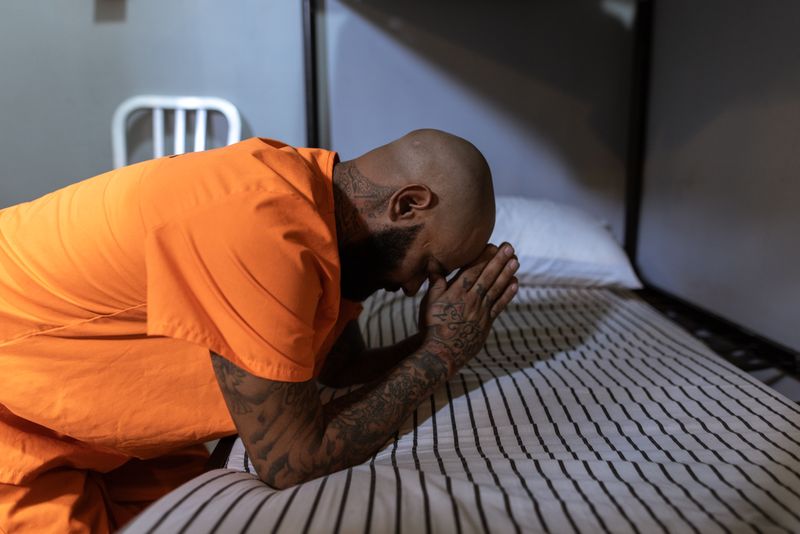Lostprophets Singer and Convicted Pedophile Ian Watkins Stabbed in Prison
Background
Former Lostprophets singer Ian Watkins has sustained multiple stab wounds after being held hostage by other inmates in the British prison where he is serving a 29-year sentence on sex offenses involving young children. Watkins was taken hostage by three fellow prisoners, leading to a six-hour standoff with corrections officers during which he was repeatedly stabbed and beaten. Watkins is currently 10 years into his sentence, which includes charges such as the rape of a child and conspiracy to rape a baby, as well as possession of child pornography. He is serving his sentence at HMP Wakefield, a notorious prison known as the “Monster Mansion” due to its high population of serial killers, murderers, and pedophiles.
The Incident and Investigation
According to reports, Watkins’ injuries were initially reported as “not life-threatening” by Sky News, but The Mirror has contradicted this, stating that his injuries are indeed “life-threatening.” The prison service has confirmed that an investigation is underway and that the police are involved. The spokesperson for the Prison Service declined to comment further until the investigation is complete.
Discussion on Prison Justice and Consequences
The stabbing incident involving Ian Watkins raises complex questions about the issue of prison justice and consequences for those who commit heinous crimes. Watkins is undeniably a highly controversial figure who has committed unimaginable acts of sexual abuse against young children. The nature of his crimes undoubtedly elicits strong emotions from the general public, including outrage and a desire for retribution.
One philosophical question that arises is whether the brutal treatment Watkins endured in prison can be seen as a form of justice or if it is simply an act of violence that perpetuates a cycle of abuse. While it is crucial to recognize that prisoners have the right to safety and protection even while incarcerated, it is also understandable that Watkins’ actions might have provoked a hostile treatment from other inmates.
The Dilemma of Prison Safety
Prisons are intended to be institutions of rehabilitation and reintegration into society. Yet, these environments often breed violence and further criminal behavior. HMP Wakefield, where Watkins is serving his sentence, has a reputation for housing some of the most dangerous individuals in the British prison system. This raises the question of how to best ensure the safety and security of prisoners while also providing opportunities for their eventual reintegration.
Prison Reform and Rehabilitation
The incident involving Ian Watkins underscores the urgent need for comprehensive prison reform and a more nuanced approach to rehabilitation. While it is essential to hold individuals accountable for their crimes, it is equally important to address the root causes of criminal behavior and focus on the potential for rehabilitation and eventual reintegration into society.
Moving Beyond Retribution
In cases involving individuals like Ian Watkins, it is crucial to move beyond a purely punitive mindset and seek more effective approaches to justice. This entails adopting policies and programs that prioritize the well-being and safety of prisoners while still acknowledging the gravity of their offenses.
Editorial
Addressing the Complexities of Prison Justice
The incident involving Ian Watkins prompts us to reflect on the multifaceted issues surrounding prison justice and its implications. On one hand, Watkins’ heinous crimes rightfully evoke outrage and a desire for justice. However, it is essential to also consider the fundamental principles of human rights and the aim of rehabilitation within the prison system.
The Limits of Retribution
While the news of Watkins’ stabbing may initially satisfy a sense of retribution, it does little to fundamentally address the underlying problems within the prison system. It is all too easy to let anger and vengeance dictate our thoughts and actions, but true justice requires a deeper understanding of the complexities at play.
Reforming the Prison System
Prison reform is an urgent and necessary step in addressing the challenges of the criminal justice system. Efforts should be focused on providing safer and rehabilitative environments that promote the well-being of all individuals involved, while still ensuring accountability for their actions.
Investing in Rehabilitation Programs
Allocating resources to comprehensive rehabilitation programs is a crucial aspect of prison reform. Such programs can help address the underlying issues that contribute to criminal behavior and provide individuals with the tools to reintegrate into society successfully.
Creating Safer Prisons
Ensuring the safety of prisoners should be a top priority for prison authorities. This requires implementing effective measures that prevent incidents of violence and establish an environment conducive to rehabilitation and personal growth.
Advice
Balancing Justice and Humanity
When confronted with disturbing news like the stabbing incident involving Ian Watkins, it is essential to remember the importance of maintaining a balance between justice and humanity. While it may be challenging to empathize with individuals who have committed unspeakable crimes, society must hold itself to higher standards in order to uphold the values of fairness, justice, and basic human rights.
Supporting Prison Reform
As members of society, we have a responsibility to advocate for comprehensive prison reform. By pushing for policies and programs that prioritize rehabilitation and address the root causes of criminal behavior, we can work towards a system that both protects the rights of individuals and promotes a safer society.
Addressing Societal Factors
To effectively reduce instances of heinous crimes, it is crucial to address the societal factors that contribute to such behaviors. This includes a comprehensive approach that considers education, mental health support, and early intervention programs. By investing in preventative measures, we can strive to create a society that minimizes the occurrence of such atrocities.
Confronting Our Own Biases
Finally, it is important to confront our own biases and emotions when dealing with cases like Ian Watkins’. We must strive to approach the issue with empathy, understanding, and a commitment to justice that is guided by the principles of fairness, compassion, and an unwavering respect for human dignity. Only through such an approach can we hope to make progress in navigating the complexities of prison justice and ensuring a safer and more just society for all.

<< photo by RDNE Stock project >>
The image is for illustrative purposes only and does not depict the actual situation.
You might want to read !
- Was justice served? Assessing the early release of Allison Mack from prison
- MLB Brawl: José Ramírez vs. Tim Anderson Spark Controversial On-Field Clash
- A Potential Swap: Evaluating the Trade Possibilities between the White Sox’s Tim Anderson and the Guardians’ José Ramírez
- NBA Star Ricky Rubio’s Mental Health Journey: A Courageous Break from Basketball
- “Unveiling the Deviance: Examining the Dark Legacy of Ian Watkins, Former Lostprophets Frontman”
- Editorial Exploration: Examining the retribution against Larry Nassar and the culture of abuse in sports
Title: Seeking Justice or Vigilante Revenge? The Violent Attack on Larry Nassar Sheds Light on Deep-Rooted Issues
- In Search of Justice: Unraveling the Mystery of Wynter Smith’s Tragic End




